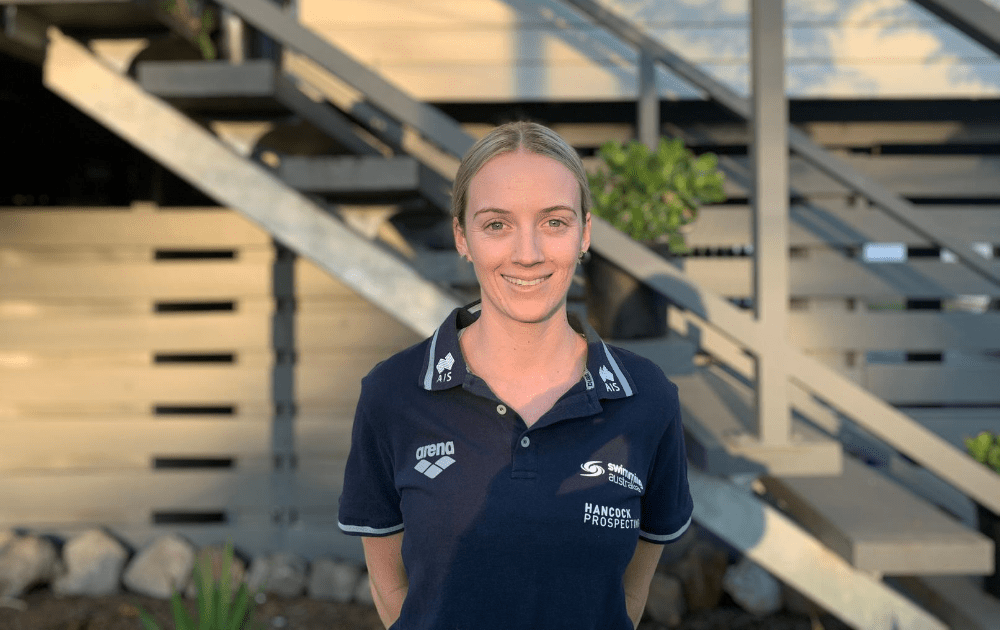Sport and physical activity play a vital role in bringing people together and helping them to extend their social networks. It also has a role in teaching young people social values such as respect, responsibility, commitment and teamwork.
This Women’s Health Week, we sat down with Sport Development Program Director Dr Brooke Harris-Reeves and alumnus Shannon Matheson to talk about the benefits to the health and wellbeing of women when they are involved in sport.

“AusPlay data shows us that 50% of Australian women and 72% of girls regularly participate in sport-related activity, but generally, women are more likely than men to be insufficiently active and are less likely to play sport,” says Brooke.
“Research also shows that women involved in sport and physical activity feel better about themselves physically, emotionally and socially. Even having a low level of physical activity is better than not being active at all.
“Participation in sport and physical activity can provide women with benefits such as prevention and management of disease, strokes, and dementia, increased mental health, reduced risks of mortality, and increased body and bone strength, just to name a few. It also helps to build confidence when you see your fitness and skills improving and goals becoming reality.”
Sadly, it’s common for girls to drop out of regular sport before reaching adulthood, something Brooke says can be addressed when developing community sports programs for women and girls.
“Health, fun and socialising are the key motivators for girls and women to stay in or start playing sport,” says Brooke.
“Inclusive and less competitive environments can increase their engagement with sport and physical activity, but women’s participation in sport and physical activity is also influenced by their individual, cultural and social origins. Program designers and providers can leverage those influences to help motivate girls and women to participate in sport and physical activity programs.”
Bachelor of Sport Development alumnus Shannon Matherson echoes Brooke’s sentiments adding that the recent profiling of women’s competitive sports is a great way to showcase to women the health and social benefits of being involved in sport.
“Sports like AFL and Rugby League that were previously seen as ‘male dominated’ are now coming into the spotlight and highlighting the grit and athleticism of women in sport as something to be desired,” Shannon explains.
“The more we can showcase women in sport through the media and through workshops and training opportunities for young girls and women, the more likely they will connect with these role models and pursue sport into the future.
“But it can also help to start that relationship with sport at a younger age, so the promotion of sport for women at a school level is critical. We need women to feel confident and strong and to be educated about the benefits of sport for them to see value in continuing throughout their lives.”
Shannon currently works for Swimming Australia as Team Operations Coordinator for Australia’s Paralympic and Open Waters Teams. She says it’s a role she wouldn’t have without the help of her contacts at Griffith University, who passed her details onto Swimming Australia before she even graduated.
“At the time, I was in my final semester of the Bachelor of Sport Development – I hadn’t even attended my graduation ceremony yet,” Shannon explains.
“Swimming Australia was advertising for the role which was only supposed to be a 5-month contract to replace someone helping out with Commonwealth Games. I attended my graduation three weeks after I started the role, and I’ve been with the organisation for almost three years!”
Shannon moved into the Bachelor of Sport Development from exercise science after talking to a career advisor about her goals. She commenced the degree when it was in its flagship year after.
“I wasn’t entirely sure what role I wanted to work in when I first started studying, but after hearing about sport development, I was confident I would be able to find a job with the qualifications and practical experience I would go on to gain through my degree,” she says.
“If you’re interested in a career in sport, this degree is the one for you – it not only covers sport related subjects like sport management, nutrition, anatomy and facility management, it also focusses strongly on getting every student as prepared and ready to transition to full time work as possible, by incorporating mock job interviews, elevator pitches, business plans, and resume/CV preparation into the coursework.
“My advice to students who are just starting the degree would be to stay focussed and dedicated to the process, ask for help when you need it, and start getting your name out in the industry by volunteering and building your work experience profile and sport network.”
If like Brooke and Shannon you have a passion for increasing women’s participation levels in sport, the Bachelor of Sport Development could be for you. Alternatively, take your degree one step further with the double degree in Sport Development and Business, which sees you building additional skills in business, sport management, and marketing. The degree is your opportunity to turn your passion for sport into your profession, and teaches you how to design, deliver and manage recreation activities for the broader community.



